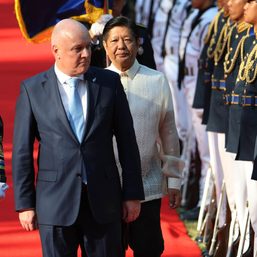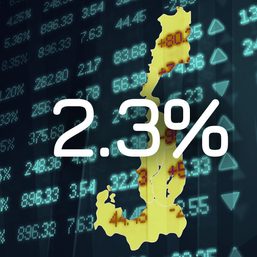SUMMARY
This is AI generated summarization, which may have errors. For context, always refer to the full article.
![[ANALYSIS] How the Marcos economy worsens inflation](https://www.rappler.com/tachyon/2023/05/tl-marcoseconomy.jpg)
The high inflation that seems to be a constant under the kind of economic governance we are forced to swallow, not having any choice on the matter, seems to have slid a sliver in recent weeks. However, there is no dancing in the streets. Prices remain extremely high in places that cannot afford the exponential multiples we endure in the metropolis.
Allow us to cite data culled from the consumer price index (CPI). As the year started, electricity inflation outside the National Capital Region was as high as 41.9% for the bottom 30% of the population. When the Marcos government took over, the comparable rate inflicted on that same population was merely 18.06%.
Now plot the numbers agains one of those campaign calendars politicians handout when begging for votes. The poorest were paying almost 300% higher. Inside two quarters, the Marcos administration more than doubled the misery for constituents it had convinced to vote for it.
There is ironic injustice in those numbers when we analyze the capacity of the bottom 30% in coping with such curses. Their inadequate incomes, their poverty and what coping mechanisms are available from a government they enabled and yet seems to have duped them in return for the ballyhooed 31-million mandate, simply worsen their plight.
When the poor must pay 42% more for electricity, their only response is to do without it. Nobel laureate for economics Amartya Sen says we need to look at deprivation when assessing the development of an economy. Inflation, when higher among the poor, adds to their deprivation forcing them to live with far less than the little they had.
How low can deprivation go under this government? Can a government be sociopathic? The data seem to say so.
There is even less cause for celebration as energy costs rise while generating shortages continue – contrary to promises made at the Department of Energy budget hearings.
An alibi
While electricity accounts for some of the differences between core and headline inflation, we apply it here as an inflation coefficient because it is a critical metric impacting throughout the economy. Energy costs are inflationary multipliers that are viral in nearly all links in any value chain.
The Marcos administration often attributes high inflation to foreign and uncontrollable uncertainties. To an extent, that is partially true. But it is also an alibi. A pathetic excuse as insubstantial as the mandate founding the podium from which it is declared. It is a half-truth. The other half is a half-lie.
Our leaders’ grasp of economics was illustrated in a recent braggadocio on the global stage on how we delude ourselves as regional frontrunners in gross domestic product (GDP). One metric is denominated in pesos. GDP growth is measured as a percentage change. If our leaders do not know the difference, what happens when they need to tackle the arithmetic?
For officials who failed even the most basic course in economics, they should realize that when supply falls short of demand, prices increase as sellers charge higher. Inflation effectively reduces purchasing power. Simply put, we all turn poorer.
Somewhere in there is the concept of economic shortage – a curse that is all too characteristic of the government we recently voted into office. The same that capitalized on the myth of ancient gold. While we admit that there are external and uncontrollable less magical variables at work, there is also a slew of homegrown, avoidable but very real factors among the kakistocracy.
Allow us to quickly list domestic and controllable factors that, either through a toxic brew of gross incompetence, plain vanilla stupidity, or fully loaded crony capitalism, we managed to record historically high shortages of even the most essential inputs enough to aggravate an already dire inflationary situation.
Here is a short list:
One is our predilection to serially increase interest rates to redirect liquidity away from circulation. That might work had our inflation been of the demand-pull kind as high rates siphon from spending. Unfortunately, raising rates is ineffective against cost-push inflation. Analyze the unfolding bank crisis in the US. It is hitting small and medium scale financial institutions fueling their forced acquisition.
Another is our penchant for addressing perceived food shortages with importations that slowly kill domestic agriculture while bloating kitchen table CPI prices. Importation has become our go-to default. Never mind that it decimates farm incomes and consumer purses while fattening a minority of chosen traders.
This segues into another catalytic CPI factor infected with shortages on one end and a surplus of incompetence at the opposite end.
For several weeks now, the failure to purchase power from the least cost sources despite their availability has forced our largest electricity franchise to buy from undependable higher cost power plants and the Wholesale Electricity Spot Market (WESM), where prices are higher due to severe baseload shortages.
To worsen inflation at the WESM, its P6.24/kWh price cap is being raised to as much as P15.00/kWh or over 140% of the original. Unperturbed by the multiplier effect of unbridled rate increases, a de facto cartel is lobbying for higher prices on the threat of further outages.
Limp-wrist governance in the agriculture and energy sectors has aggravated the food and energy shortages and the resulting inflation which we will continue to suffer for the rest of the year as these sectors continue to rely on expensive importations.
Further aggravating that is when we leverage to fill in a deficit which for the first quarter of 2023 ran as high as P270.88 billion. Borrowing to cover poor revenues and tax collection shortfalls due to low production can be inflationary. Think of it this way: Collection shortfalls compel filling the deficit with borrowings. Borrowings increase money supply. Increases in money supply raise prices where production and manufacturing remain in a catch-up mode.
So, are these inflationary factors imported and uncontrollable? For the delusional, yes. – Rappler.com
Dean de la Paz is a former investment banker and managing director of a New Jersey-based power company operating in the Philippines. He is the chairman of the board of a renewable energy company and is a retired Business Policy, Finance, and Mathematics professor.
Add a comment
How does this make you feel?
![[ANALYSIS] GDP growth ‘rising,’ ‘outstanding’? It’s at its lowest in nearly 2 years](https://www.rappler.com/tachyon/2023/05/GDP-down-TL-may-12-2023.jpg?fit=449%2C449)





![[In This Economy] Runaway rice prices are making inflation higher than it needs to be](https://www.rappler.com/tachyon/2024/02/tl-rice-prices.jpg?resize=257%2C257&crop=560px%2C0px%2C720px%2C720px)
![[ANALYSIS] A soft and range-bound stock market that has not lost its luster](https://www.rappler.com/tachyon/2024/02/TL-market-soft-range-bound-February-9-2024.jpg?resize=257%2C257&crop_strategy=attention)
![[In This Economy] Looks like PH economy will never get back on track. Here’s the data.](https://www.rappler.com/tachyon/2024/02/20240202-PH-economy-back-on-track.jpg?resize=257%2C257&crop=289px%2C0px%2C720px%2C720px)


![[ANALYSIS] A new advocacy in race to financial literacy](https://www.rappler.com/tachyon/2024/04/advocacy-race-financial-literacy-April-19-2024.jpg?resize=257%2C257&crop_strategy=attention)


![[In This Economy] Can the PH become an upper-middle income country within this lifetime?](https://www.rappler.com/tachyon/2024/04/tl-ph-upper-income-country-04052024.jpg?resize=257%2C257&crop=295px%2C0px%2C720px%2C720px)

There are no comments yet. Add your comment to start the conversation.